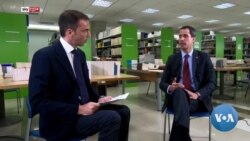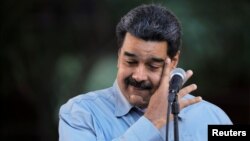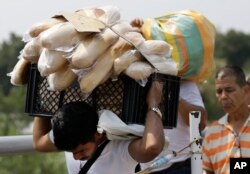Tensions are high in the Colombian border city of Cucuta as the first trucks carrying U.S. aid arrived Thursday to cross the border into Venezuela.
Two large trucks loaded with emergency food, medical supplies and other humanitarian aid are awaiting permission from Venezuelan President Nicolas Maduro to enter the country. Maduro has rejected the aid and ordered soldiers to stop supplies from crossing a bridge between Colombia and Venezuela, saying a humanitarian crisis does not exist in Venezuela.
Venezuelan security forces have blocked the three-lane border crossing from Cucuta using two shipping containers and a fuel tanker. Human rights activists and Venezuelan citizens gathered at the border crossing demanded Maduro allow the emergency aid to cross the bridge linking the neighboring countries.
WATCH: Guaido Calls for Help for Venezuela's Transition to Democracy
Opposition leader Juan Guaido, who has declared himself interim president, requested the aid, warning many Venezuelans face severe risks without international help.
Don't make aid a ‘political pawn’
The U.S. State Department, which procured the aid, called on Venezuelan security forces to allow the supplies to enter the country.
A spokesman for U.N. Secretary-General Antonio Guterres said Thursday “humanitarian aid should never be used as a political pawn” and must be carried out in “accordance with the principles of humanity, neutrality, impartiality and independence.”
Maduro has been under increasing international pressure to step down after major European Union nations joined the United States, Canada and a group of Latin American countries this week in recognizing Guaido as Venezuela’s legitimate interim leader following Maduro’s re-election last year in polling that critics say was mired in fraud.
Maduro offered asylum
U.S. special envoy for Venezuela Eliot Abrams said Thursday the time for talks with Maduro “has long passed” except to negotiate his departure.
Abrams told reporters at the State Department Maduro has “friends” in Cuba and Russia. He also said several other countries that he did not name have offered to give Maduro asylum.
Abrams announced that the U.S. has revoked visas for some members of Venezuela’s constituent assembly, whose job it is to put together a new constitution.
European and Latin American diplomats meeting in Uruguay said Thursday Venezuela’s problems need to be solved without violence and foreign intervention. They say it is up to the Venezuelan people to find a resolution.
Maduro, who was inaugurated last month for a second six-year term, has so far refused any suggestions to hold early elections and is refusing to go.
As head of the opposition-controlled National Assembly, Guaido invoked the constitution in pronouncing the Maduro government illegitimate and declaring himself interim president until a new election is held.
The collapse in world energy prices along with corruption and failed Socialist policies has wrecked the Venezuelan economy. Food, fuel and many basic goods are in severely short supply and inflation is out of control.
Millions of Venezuelans have fled the country, with millions more expected to go.
Maduro has shown little tolerance for anti-government protests and blames the United States for backing the opposition and plotting a coup.









